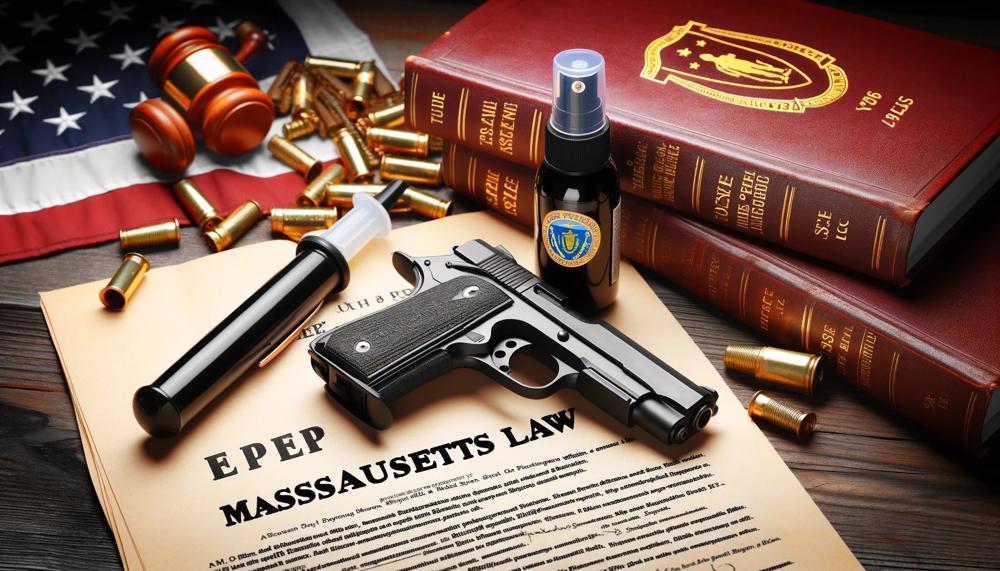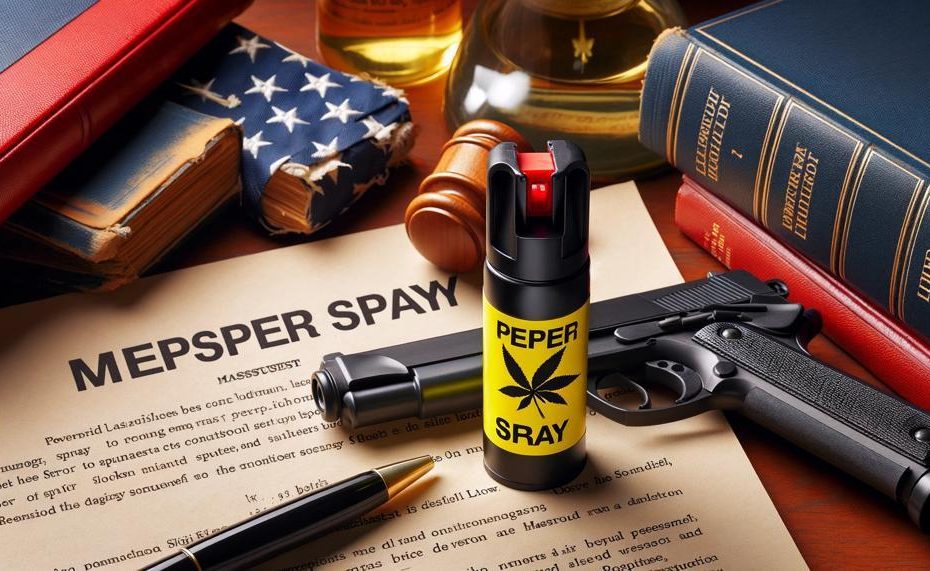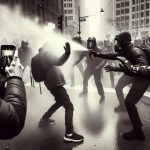Imagine strolling through the cobbled streets of historic Boston, where every corner boasts a story as rich as the clam chowder for which the city is famous. But what if your picturesque walk was interrupted by a sudden need for personal protection? It’s a scenario no one likes to consider, yet it’s crucial to be informed about your self-defense options.
In Massachusetts, the question of whether you can legally carry pepper spray is not just a curious inquiry—it’s a matter of understanding the intricate dance between personal safety and legal guidelines.
Dive into the complex world of Massachusetts law where we unravel the tapestry of regulations surrounding the possession and use of pepper spray. Here’s a sneak peek into what we’ll uncover:
- The Legal Landscape: Discover the specific statutes that govern the use of pepper spray in the Bay State.
- Purchase Pointers: Guidelines on where and how you can legally obtain pepper spray.
- Carry Considerations: Insights into who can carry pepper spray and any age restrictions you should be aware of.
- Use with Caution: The circumstances under which deploying pepper spray is legally justified.

Embark on this exploration with us as we navigate the legalities, dispel myths, and provide you with the knowledge to confidently carry—and if necessary, use—pepper spray in Massachusetts. Whether you’re a lifelong resident or a newcomer to the Commonwealth, understanding your rights to self-defense shouldn’t be a labyrinthine quest.
Let’s walk through this together, ensuring that if the moment arises, you’re as prepared in knowledge as you are in defense.
Contents
- 1 Is Pepper Spray Legal In Massachusetts?
- 2 The Legality of Pepper Spray in Massachusetts
- 3 Types of Pepper Spray Legal in Massachusetts
- 4 Obtaining Pepper Spray in Massachusetts
- 5 Restrictions on Carrying Pepper Spray in Public
- 6 Using Pepper Spray for Self Defense: Dos and Don’ts
- 7 Alternatives to Pepper Spray for Self Defense in Massachusetts
- 8 Conclusion
Is Pepper Spray Legal In Massachusetts?
Pepper spray is indeed lawful in Massachusetts for self-defence, subject to specific conditions and stipulations.
| Aspect | Detail | Remarks |
| Legal Age | 18+ | Individuals under 18 are prohibited from possessing pepper spray. |
| Type of Spray | Self-defense spray | Max weight of 1.5 oz, other types like bear repellent are not permitted. |
| Use Circumstances | Self-defence against bodily harm | Must be reasonable belief of threat. |
| Proportionality | Use as last resort | Must be proportional to the level of threat. |
| Purchasing | From licensed dealers | Ensures legal compliance and quality of the product. |
| Federal Law | National Firearms Act compliance | Registration required for pepper spray guns. |
| Restrictions on Use | No use against officers, no retaliation | Use for aggression can lead to criminal charges. |
| Training | Understand proper use | Correct handling is crucial for effectiveness and safety. |
The Legality of Pepper Spray in Massachusetts
Pepper spray is a permitted self-defense tool in Massachusetts, but it’s wrapped in several layers of legal tape.
Purchase and Possession:
To own pepper spray, you must be 18 or older. A Firearms Identification Card (FID) is a must-have to purchase or possess pepper spray unless you’re over the age of 18 and only carrying self-defense spray.
Chemical Composition and Size Limits:
Your pepper spray should pack oleoresin capsicum (OC) and not cross the 2% concentration mark.
Keep it snug and small; the largest size allowed for personal carry is a 2-ounce container.
Usage Restrictions:
Only pull out the pepper spray when danger’s afoot. Using it for punishment or during a consenting scuffle? That’s a no-go and could land you in hot water with the law.
Carrying in Public:
Certain no-spray zones include schools, government buildings, and airports. Don’t even think about boarding public transport with your spray unless you’ve got the transit authority’s nod.
Labeling Requirements:
Stay informed about what you’re carrying. The container should bear the manufacturer’s name, the expiration date, and a how-to-use guide.
Types of Pepper Spray Legal in Massachusetts
Massachusetts law permits the use of pepper spray for self-defense, subject to certain regulations.
Here’s a breakdown of the types of pepper spray that comply with Massachusetts legal standards:
Traditional Aerosol Canisters
Traditional canisters, the most common type of pepper spray, are compact and simple to use.
They must contain no more than 10% oleoresin capsicum concentration and adhere to the weight limitation of 15-20 grams.
Gel-Based Sprays
Gel-based pepper sprays emit a sticky substance that is harder to remove, providing a longer-lasting impact.
These sprays can reach up to 20 feet and must also meet the 10% OC concentration and weight restrictions.
Foam-Based Sprays
Foam-based options produce a thick, blinding foam, impeding an attacker’s sight and movement.
Some variants include UV dye to mark assailants for later identification. They, too, must conform to the same oleoresin capsicum and weight requirements.
Also Read: # Pepper Spray Guns
Pepper spray guns offer a more precise and extended-range defense solution, using compressed air to project the spray. These devices fall within legal acceptance when they contain the regulated OC concentration and weight.
Obtaining Pepper Spray in Massachusetts
To legally obtain pepper spray in Massachusetts, you must navigate a series of stringent requirements and adhere to precise regulations. Below is a table summarizing the key steps and legal stipulations:
| Requirement/Regulation | Description | Details |
| FID Card | Mandatory identification for purchase | Must be at least 18 years old; involves a background check and a safety course. |
| Firearms Permit | Permit for carrying pepper spray | Available to those 21 and over; entails an additional background check and training. |
| OC Concentration | Legal chemical composition | Pepper spray must contain less than 10% oleoresin capsicum. |
| Weight Restriction | Legal carrying size | Only sprays with a maximum weight of 2 ounces are permitted. |
In essence, to carry pepper spray, one must first secure a Firearm Identification (FID) card, a process that includes a criminal background scrutiny and a state-approved safety training. Post obtaining the FID card, a separate firearms permit is needed to purchase and carry pepper spray, which again requires a background check and specialized training on the proper handling and use of the substance.
Please bear in mind, lads and lasses, the age limitations: you’ve got to be at least 18 to get your mitts on an FID card and a more seasoned 21 for the firearms permit. When it comes to the pepper spray itself, keep it to 2 ounces max and make sure it doesn’t pack more than a 10% punch of oleoresin capsicum.
Adhering to these rules is not just a matter of staying on the right side of the law; it’s about ensuring that the power of self-defense is balanced with responsible use.
Restrictions on Carrying Pepper Spray in Public
In Massachusetts, pepper spray is recognized as a legitimate means of personal protection. Yet, it’s governed by a framework of regulations to prevent misuse. Here’s the lowdown on the current legal landscape:
Legal Age and Purchase Requirements
| Location | Is Pepper Spray Allowed? | Remarks |
| School grounds/events | No | Classified as a prohibited weapon here. |
| Government buildings | No | Carrying pepper spray is a criminal offense in these places. |
| Public transport | No | Pepper spray is banned on buses, trains, etc. |
Using Pepper Spray for Self Defense: Dos and Don’ts
- Do ensure you’re eligible to carry pepper spray.
- Do obtain the proper license if required.
- Do not carry pepper spray if you fall under restricted categories.
- Do purchase from a licensed dealer.
- Don’t use pepper spray indiscriminately; it’s for self-defense only.
- Do stay informed about the regulations surrounding alternative defense items like Pepperball or Byrna launchers.
Alternatives to Pepper Spray for Self Defense in Massachusetts
In Massachusetts, individuals seeking non-lethal means for personal safety have several lawful options apart from pepper spray. The table below outlines these alternatives, each with its specifications and conditions for use:
| Alternative | Description | Conditions and Notes |
|---|---|---|
| Stun Guns | Devices that incapacitate via electrical shock. | Require a firearms license; to be used when in reasonable fear for safety. |
| Personal Alarms | Devices emitting a loud sound to deter attackers and attract attention. | No legal restrictions; suitable for carrying by any individual. |
| Folding Knives | Blades under 2.5 inches that fold into the handle. | Legal for general carry; fixed blades require a valid reason. |
| Martial Arts Weapons | Including nunchucks and throwing stars. | Allowed for self defense, excluding prohibited items like switchblades. |
It’s savvy to keep abreast of the latest legal updates to ensure compliance. Remember, while the likes of stun guns pack a punch, they’re not to be trifled with lightly—only brandish them when you’re in a real pickle.
Folding knives are handy and more than just a tool; in a bind, they could save your skin. As for personal alarms, they’re as unassuming as a sparrow but loud enough to scare the bejesus out of an unsuspecting assailant.
Martial arts weapons might make you feel like a ninja, but ensure you’re up to snuff on the do’s and don’ts before you carry them.
Conclusion
In summary, Massachusetts’s laws governing pepper spray strike a delicate balance between responsible ownership and the right to self-defense.
You may carry and own pepper spray without a FID card if you’re older than 18, but you have to acquire it from a licensed vendor to ensure that you’re following all applicable state and federal regulations. The Commonwealth only permits the use of sprays for self-defense under circumstances when there is a reasonable fear of impending harm, with a limit of 1.5 to 2 ounces of active component and a 10% OC concentration.
Not only is it forbidden in certain public areas, such as government buildings and schools, pepper spraying is criminal when used maliciously or against police enforcement. It is strongly advised to get training to guarantee safe and efficient usage.
If you carry it appropriately and keep up with the legal framework that governs its usage, you’ll not only have a weapon for protection but also the expertise to utilize it inside the law.





